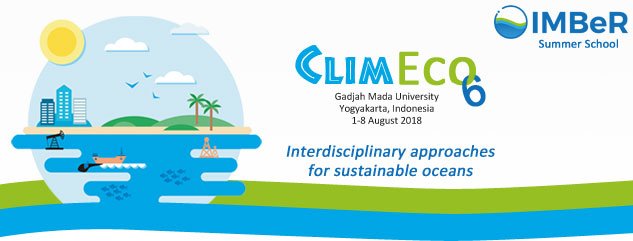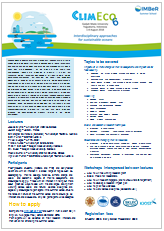
IMBeR ClimEco6 Summer School - Interdisciplinary approaches for sustainable oceans
Location: Gadjah Mada University, Yogyakarta, Indonesia
The ecological goods and services provided by the oceans are critical to human welfare. However, sustainable management of these resources is of concern given the complex and dynamic social-ecological systems in which they are embedded. As the effects of both natural and anthropogenic impacts are projected to intensify, it is clear that successful marine resources management for human well-being and ecological sustainability, will require more holistic governance approaches that consider the social and ecological dimensions in tandem. The success of holistic marine governance is underpinned by the provision of interdisciplinary science that integrates both the social and natural sciences, to decision-makers. To this end, the ClimEco6 Summer School aims to contribute to the development of the next generation of interdisciplinary marine researchers. Drawing on the expertise of lecturers from the natural, social and economic sciences, participants will develop a strong theoretical and applied understanding of each discipline, and how they can be integrated to solve some of the challenges facing the oceans. To complement this, participants will also gain practical skills in science communication and how to operate at the science-policy-society interface, so that they can more effectively influence the decision-making process relating to the marine environment.
Topics to be covered
Impacts of climate change on marine ecosystems and implications for food security
- Delineating the issues of climate change and impacts to marine ecosystems
- Oceanographic and biogeochemical processes
- Ecological impacts and processes of changes
- Social and economic impacts of climate and change in marine systems
- Sources of food from the ocean and introduction to food security and the supply chain
- Local vs regional vs global impacts and links to human health consequences
- Achieving food security and linking across boundaries
Modelling
- Modelling basics
- Ecological models
- Economic and bio-economic modelling
- Agent based models
- Network Modelling
- Baysian Belief Network Modelling
- Coupled models
- Climate projects and uncertainty
Social and economic research techniques
- Introduction to social science
- Quantitative vs qualitative social science research techniques
- Social psychology and behavioural economics
- Ethics or social science
Governance and managing marine resources
- Introduction to marine governance, and different models of governance
- The role of science in marine governance, and how to improve knowledge exchange between science and policy to allow adaptive decision-making processes
- Unexpected management outcomes (using real examples and how we might prevent them in the future)
- Role of indicators for policy/engagement
- Role of society in governance
- Climate change mitigation and adaptation
Workshops will be interspersed between lectures
- How to write a winning research grant
- Social media for researchers
- How to write scientific papers (and to know where to target them)
- How to develop a research impact plan
- How to prioritise workloads
- How to work across disciplines (collaborate well)
Participants
Post-graduate students (Masters and PhD) and early-career scientists (< seven years post PhD) with an interest in topics such as, oceanography, biogeochemistry, fisheries, climate change and social and economic aspects of marine ecosystems are encouraged to apply. It will also be of considerable interest to those who want to find out more about practical ways to deal with the challenges arising from working across social and natural science disciplines. Because of the hands-on nature of the summer school, and to facilitate good discussions and interactions, the number of participants will be limited to 60. We aim to have participants from a wide geographic and disciplinary distribution.
How to apply and registration fees
Complete the Application Form and submit it together with a short CV (in English, no more than two pages!) before 2 April 2018.
Applicants wil be seleted on their research interests and experience, and their reasons and motivation for wanting to attend the summer school.
Registrations fees are 300 Euros for students and 350 Euros for Early Career Researchers

